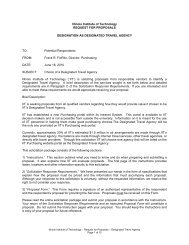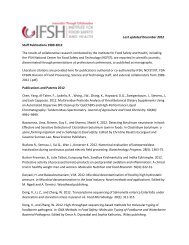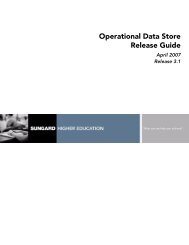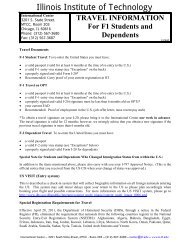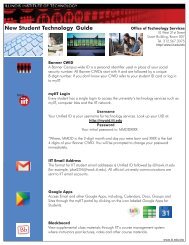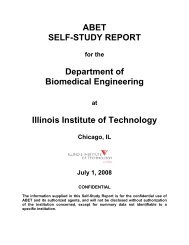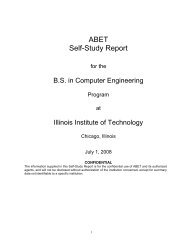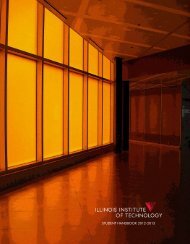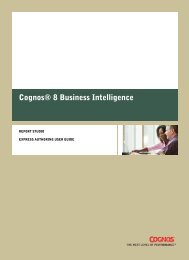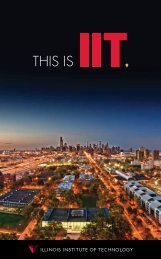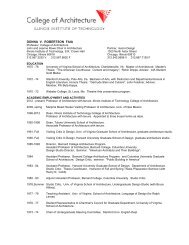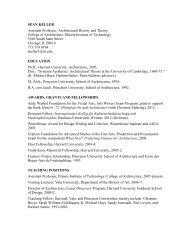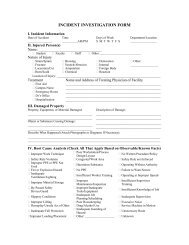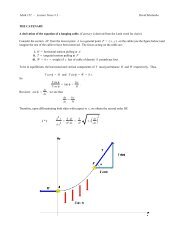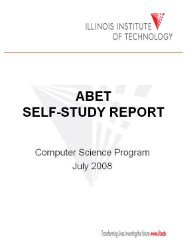Undergraduate Bulletin - Illinois Institute of Technology
Undergraduate Bulletin - Illinois Institute of Technology
Undergraduate Bulletin - Illinois Institute of Technology
You also want an ePaper? Increase the reach of your titles
YUMPU automatically turns print PDFs into web optimized ePapers that Google loves.
Course Descriptions<br />
ENVE 310<br />
Introduction to Environmental Engineering<br />
Principles and applications <strong>of</strong> engineering processes for air<br />
and water pollution control. Topics include environmental<br />
resource management and methods for environmental quality<br />
control including identification <strong>of</strong> pollution sources, effects,<br />
and controls.<br />
(3-0-3)<br />
ENVE 401<br />
Introduction to Water-Resources Engineering<br />
Principles <strong>of</strong> hydraulics and water demand projections as<br />
used in the design <strong>of</strong> reservoirs, water distribution systems,<br />
and storm and sanitary sewers; aspects <strong>of</strong> water resource<br />
management and environmental engineering economics.<br />
(3-0-3)<br />
ENVE 404<br />
Water & Wastewater Engineering<br />
Principles and applications <strong>of</strong> physical, chemical, and biological<br />
processes for water and waste purification. Design<br />
<strong>of</strong> engineering treatment systems to meet water quality and<br />
effluent standards. Requires junior standing.<br />
(3-0-3)<br />
ENVE 426<br />
Statistical Tools for Engineers<br />
Descriptive statistics and graphs, probability distributions,<br />
random sampling, independence, significance tests, design<br />
<strong>of</strong> experiments, regression, time series analysis, statistical<br />
process control, and introduction to multivariate analysis.<br />
Requires junior standing.<br />
(3-0-3)<br />
ENVE 463<br />
Introduction to Air Pollution Control<br />
Air pollution sources and characteristics <strong>of</strong> source emissions,<br />
atmospheric reactions, effects <strong>of</strong> pollutants, and techniques<br />
<strong>of</strong> emission control; legal and administrative aspects <strong>of</strong> air<br />
pollution control.<br />
(3-0-3)<br />
ENVE 476<br />
Engineering Control <strong>of</strong> Industrial Hazards<br />
Design <strong>of</strong> control systems to enhance occupational safety and<br />
health; how to recognize and control existing or potential<br />
safety and health hazards.<br />
Prerequisite(s): [(ENVE 426*)] An asterisk (*) designates a<br />
course which may be taken concurrently.<br />
(3-0-3)<br />
ENVE 481<br />
Hazardous Waste Engineering<br />
Engineering principles applied to the control <strong>of</strong> hazardous<br />
waste generation, handling, collection, transport, processing,<br />
recovery, and disposal. Treatability and design <strong>of</strong> hazardous<br />
waste treatment process.<br />
(2-3-3)<br />
ENVE 485<br />
Pollution Prevention<br />
Industrial Ecology is the study <strong>of</strong> how to manage human<br />
activity on a sustainable basis. It is an interdisciplinary<br />
field involving technology (sciences and engineering), public<br />
policy and regulatory issues, and business administration.<br />
The overall goal <strong>of</strong> this course is to promote creative and<br />
comprehensive problem solving through the application <strong>of</strong><br />
Industrial Ecology tools such as Industrial Metabolism,<br />
Input-Output Analysis, Life Cycle Assessment, Accounting,<br />
and Design for the Environment. Same as EM 507.<br />
(3-0-3)<br />
ENVE 496<br />
Chemical Process Design II<br />
Group project in process design. Integration <strong>of</strong> technical,<br />
safety, environmental, economic and societal issues in process<br />
development and design.<br />
(3-0-3)<br />
GRADUATE COURSES<br />
Degree-seeking undergraduates may take graduate courses with<br />
approval <strong>of</strong> the course instructor and faculty advisor. For course<br />
descriptions, see the IIT <strong>Bulletin</strong>: Graduate Programs.<br />
ENVE 501<br />
Environmental Chemistry<br />
ENVE 506<br />
Chemodynamics<br />
ENVE 513<br />
Biotechnological Processes in Environmental Engineering<br />
ENVE 545<br />
Environmental Regulations and Risk Assessment<br />
ENVE 570<br />
Air Pollution Meteorology<br />
ENVE 572<br />
Ambient Air Monitoring<br />
ENVE 576<br />
Indoor Air Pollution<br />
ENVE 585<br />
Groundwater Contamination and Pollutant Transport<br />
Food Process Engineering<br />
FPE 201<br />
Nutrition & Wellness<br />
Introduction to the basic principles <strong>of</strong> nutrition and the<br />
relationship <strong>of</strong> the human diet to health. Overview <strong>of</strong> the<br />
nutrition pr<strong>of</strong>ession, the biological uses <strong>of</strong> nutrients, and<br />
tools for dietary planning and assessment in various settings.<br />
Examination <strong>of</strong> specific issues such as weight management,<br />
sports nutrition, food safety, the diet-disease relationship, and<br />
global nutrition. Analysis <strong>of</strong> special nutritional requirements<br />
and needs during the life cycle. Same as FST 201.<br />
(3-0-3)<br />
FPE 401<br />
Nutrition, Metabolism & Health<br />
Study <strong>of</strong> structures, types, and metabolism <strong>of</strong> carbohydrates,<br />
lipids, and proteins. Discussion <strong>of</strong> the biological roles <strong>of</strong> vitamins<br />
and minerals. Application and integration <strong>of</strong> metabolic<br />
knowledge with health promotion and chronic disease.<br />
(3-0-3)<br />
FPE 402<br />
Research Project: Design, Delivery, & Dissemination<br />
This course is an introduction to designing, conducting, and<br />
reporting on scientific research. Topics will include defining<br />
a problem and creating a research proposal, experimental<br />
design, data collection and analysis, and a written and oral<br />
presentation <strong>of</strong> results. Same as FST 402.<br />
(3-0-3)<br />
221



